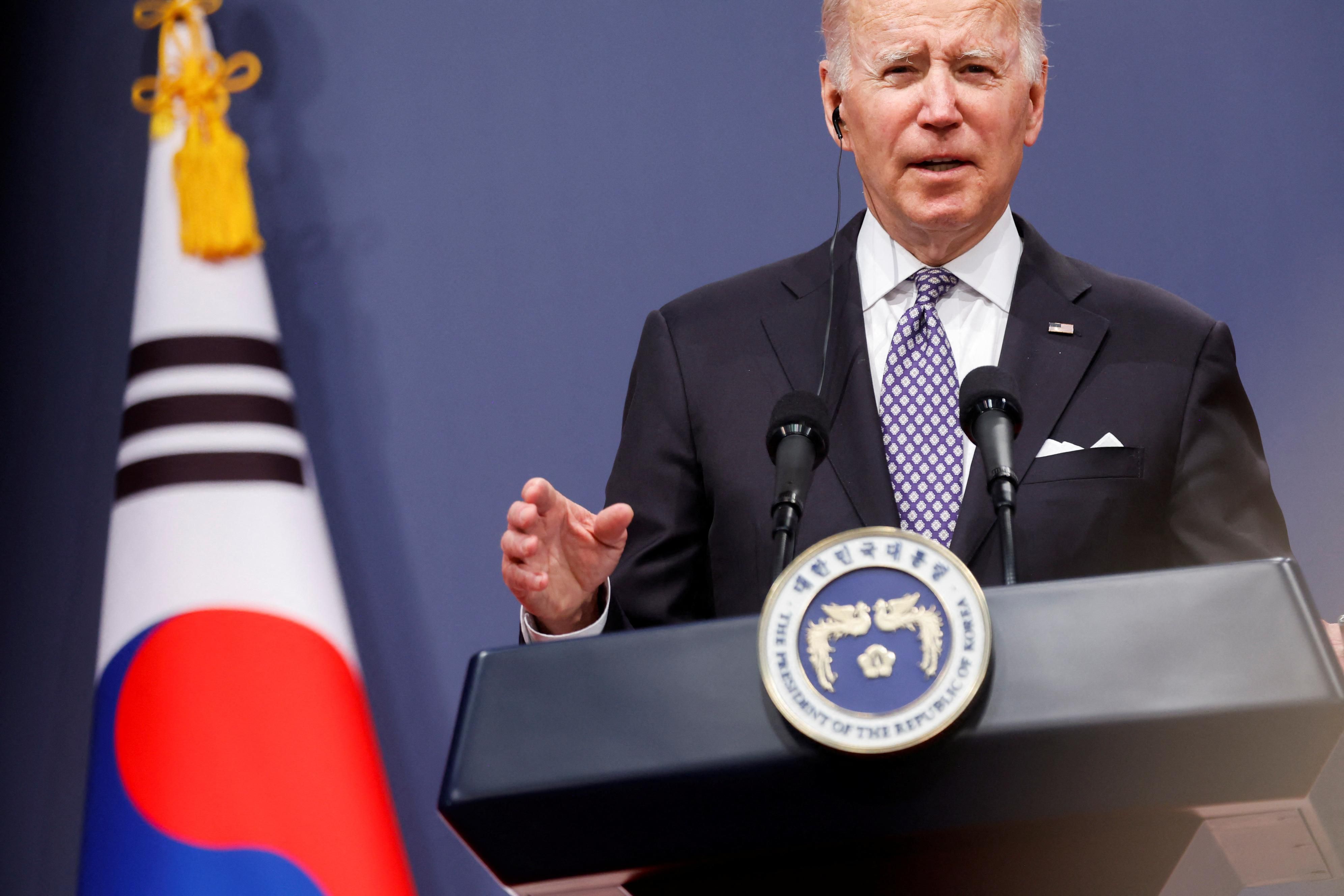In his first presidential trip to Asia, where he is visiting South Korea and Japan as well as huddling with Quad partners, Joe Biden isn’t expected to sign any major trade deals or defense agreements. But America’s commander-in-chief is going to be in China’s neighborhood, shoring up new and old alliances in the region, reminding Beijing that checking the PRC is very much on Washington’s agenda, despite the administration’s attention being taken up by domestic politics and the war in Ukraine.
Shadows loom. Just before Biden arrived in South Korea, China announced war games in the disputed waters of the South China Sea. The military exercises will continue through most of his visit. Meanwhile, amid reports of North Korea’s plans to conduct a missile or even a nuclear test (the country’s first since 2017) during the trip, South Korea announced there could be a schedule change if Pyongyang engages in “provocation” (the possibility of a nuclear test has been assessed as “low” by Seoul, but that of an ICBM test launch is “imminent”). Reiterating that he’s ready for contingencies, and reflecting the frustrating position that his administration finds itself in for restarting talks with Pyongyang, Biden had a succinct message for North Korean leader Kim Jong Un: “Hello. Period.”
Fixing an imbalance. With its military bases and assets deployed across the region, the US continues to exert significant strategic influence. But the US approach to Asia has been critiqued as lopsided and for being too military-centric and not focused enough on trade, especially since the US has lost commercial traction there since opting out of the Trans-Pacific Partnership trade deal during the Trump years.
Hoping to change that, Biden’s economic agenda is underscored by his itinerary: His first stop on the five-day trip was a Samsung semiconductor factory in Pyeongtaek, South Korea. Tackling supply chain disruption with the help of the South Koreans is an essential agenda item, but so is getting their business. Biden met with the boss of auto giant Hyundai, another South Korean company that has gotten presidential praise for investing in the US, especially in electric vehicle jobs.
To regain economic traction, Biden will launch the Indo-Pacific Economic Framework as a possible alternative to the TPP — now called CPTPP — but without the unfettered trade and tariff breaks. A framework is not a trade agreement — it’s an agreement about an agreement — and with midterm elections looming and political pressures at home from the liberal, pro-worker wing of his party, it’s unclear how much market access the IPEF will offer to TPP-dominated Asia. Some of America’s traditional partners and allies will surely sign the IPEF, but reports suggest the framework won’t amount to much, at least not at this stage. Biden’s IPEF invitation list doesn’t yet feature Taiwan because including the self-ruled island claimed by China wouldn’t go down well in Beijing.
Reassuring allies is the diplomatic theme of the trip, for many US partners were spurned by the Trump administration’s “America First” approach. But choosing to visit South Korea before America’s more senior partner in the region, Japan, is Biden’s tip of the hat to newly elected President Yoon Suk-Yeol, a conservative who is considered a hawk on ties with China.
Yoon’s government has backed the US in sanctioning Russia, and while his predecessor refused to take sides in the confrontation between the US and China — Washington is Seoul’s only military ally, but Beijing is its largest trade partner — the new president has clearly said that he supports a rules-based “free and open” order in the Indo-Pacific. Yoon has even suggested that the Quad, the security partnership between the US, Japan, India, and Australia, be expanded to include South Korea, and is pushing for increased military exercises.
However, Biden’s also hoping to do some bridge-building — ties between Tokyo and Seoul have worsened, and Biden has stressed that improving the trilateral relationship between the US, Japan, and South Korea is “critically important.” He’ll also break the ice with Australia’s new PM Anthony Albanese, whose weekend victory with promises to restore liberal values Down Under is being compared to Biden’s own election.
There’s also clear signaling to an increasingly assertive China. Biden will re-connect with the Quad — the dialogue between Australia, India, Japan, and the US dubbed derisively by China as a possible “Indo-Pacific NATO” — on the last day of his trip. This is expected to be a show of unity against Beijing’s recent muscular moves: The PRC’s plans for a military base in the Solomon Islands have triggered the US and Australia to declare that they're open to military options to deal with a potential Chinese military threat, even as Chinese troops continue to harden their positions in the heights of the Himalayan territory disputed by India. They’ll also discuss illegal maritime practices by China, convergences on the Ukraine crisis, the global food shortage, and the question of how to deal with a strategically autonomous India, which has yet to condemn Vladimir Putin’s actions or cut trade ties with Moscow. Delhi also recently banned wheat exports, further spiking global food prices.
“The Ukraine crisis is clearly an albatross around the neck of the Quad, in the sense that India knows that the issue will continue to be discussed within the Quad,” says Michael Kugelman, deputy director of the Asia Program at the Wilson Center.
But the Quad is unlikely to push PM Narendra Modi’s government for a tougher stance against Moscow. Instead, Kugelman says, the Quad’s focus is likely to be on humanitarian concerns, where all members are in alignment, and other shared interests, such as pushing a vaccine production plan, exploring emerging technologies and clean energy, are on the menu.
Staring down China, winning over friends old and new, but not in a position to trade much, Biden’s Asian business trip is part blitz, part bluster.
This comes to you from the Signal newsletter team of GZERO Media. Subscribe for your free daily Signal today.
